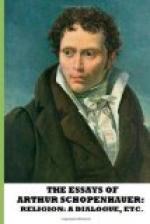Philalethes. That is certainly the strong point of religion. If it is a fraud, it is a pious fraud; that is undeniable. But this makes priests something between deceivers and teachers of morality; they daren’t teach the real truth, as you have quite rightly explained, even if they knew it, which is not the case. A true philosophy, then, can always exist, but not a true religion; true, I mean, in the proper understanding of the word, not merely in that flowery or allegorical sense which you have described; a sense in which all religions would be true, only in various degrees. It is quite in keeping with the inextricable mixture of weal and woe, honesty and deceit, good and evil, nobility and baseness, which is the average characteristic of the world everywhere, that the most important, the most lofty, the most sacred truths can make their appearance only in combination with a lie, can even borrow strength from a lie as from something that works more powerfully on mankind; and, as revelation, must be ushered in by a lie. This might, indeed, be regarded as the cachet of the moral world. However, we won’t give up the hope that mankind will eventually reach a point of maturity and education at which it can on the one side produce, and on the other receive, the true philosophy. Simplex sigillum veri: the naked truth must be so simple and intelligible that it can be imparted to all in its true form, without any admixture of myth and fable, without disguising it in the form of religion.
Demopheles. You’ve no notion how stupid most people are.
Philalethes. I am only expressing a hope which I can’t give up. If it were fulfilled, truth in its simple and intelligible form would of course drive religion from the place it has so long occupied as its representative, and by that very means kept open for it. The time would have come when religion would have carried out her object and completed her course: the race she had brought to years of discretion she could dismiss, and herself depart in peace: that would be the euthanasia of religion. But as long as she lives, she has two faces, one of truth, one of fraud. According as you look at one or the other, you will bear her favor or ill-will. Religion must be regarded as a necessary evil, its necessity resting on the pitiful imbecility of the great majority of mankind, incapable of grasping the truth, and therefore requiring, in its pressing need, something to take its place.




